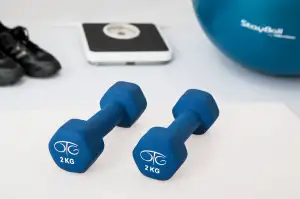Fuel Your Body with Nutrient-Rich Protein Bars: The Perfect Snack for Optimal Health

Protein bars have become increasingly popular as a convenient and nutritious snack option. These compact and portable bars are packed with essential nutrients, making them an ideal choice for individuals looking to fuel their bodies with a quick and healthy boost. Whether you're an athlete in need of post-workout recovery or simply seeking a nutritious on-the-go snack, protein bars offer a convenient solution. In this article, we will explore the benefits of protein bars, how to choose the right one for your needs, and even provide some homemade recipes for those who prefer to make their own. So let's dive in and discover the world of nutrient-rich protein bars!
Benefits of Protein Bars
Protein bars offer numerous benefits that make them an ideal snack for optimal health. Firstly, protein is essential for building and repairing tissues, making it crucial for muscle development and recovery after exercise. Protein bars provide a convenient and portable source of high-quality protein, which can help support muscle growth and aid in post-workout recovery.
Additionally, protein bars are often fortified with vitamins and minerals, providing a well-rounded nutritional profile. These nutrients play vital roles in maintaining overall health and supporting various bodily functions. By consuming protein bars, individuals can easily meet their daily nutrient requirements without the need for multiple snacks or supplements.
Protein bars also serve as a satisfying snack option that helps curb hunger cravings. The combination of protein, fiber, and healthy fats found in these bars promotes satiety, keeping you feeling full for longer periods. This can be especially beneficial for those looking to manage their weight or control their calorie intake.
Moreover, protein bars are a convenient on-the-go snack that fits into busy lifestyles. They require no preparation and can be easily carried in your bag or pocket. Whether you're at work, traveling, or exercising outdoors, having a protein bar on hand ensures you have a nutritious snack readily available to fuel your body throughout the day.
In summary, the benefits of protein bars include providing a convenient source of high-quality protein for muscle development and recovery, offering a well-rounded nutritional profile with essential vitamins and minerals, aiding in appetite control and weight management, as well as being a portable snack option for individuals with busy lifestyles. Incorporating protein bars into your diet can contribute to overall health and support your journey towards optimal well-being.
Choosing the Right Protein Bar
When it comes to protein bars, not all are created equal. With so many options available on the market, it's important to choose the right one that suits your needs and preferences. Here are a few factors to consider when selecting a protein bar:
1. Read the ingredients: Look for bars that have a short and simple ingredient list. Avoid bars that contain artificial sweeteners, high fructose corn syrup, or hydrogenated oils.
2. Check the protein content: Aim for a bar that contains at least 10 grams of protein per serving. This will help keep you feeling full and satisfied between meals.
3. Consider the carbohydrate content: If you're following a low-carb diet, opt for protein bars with fewer carbohydrates. Look for bars that have less than 20 grams of carbs per serving.
4. Pay attention to sugar content: Many protein bars can be loaded with added sugars, which can negate their health benefits. Choose bars with no more than 10 grams of sugar per serving.
5. Look for fiber: Fiber is an important nutrient that aids in digestion and helps keep you feeling full longer. Select bars that contain at least 3 grams of fiber per serving.
6. Consider your dietary restrictions: If you have specific dietary needs or restrictions, such as being gluten-free or vegan, make sure to choose a protein bar that meets those requirements.
By taking these factors into consideration, you can ensure that you're choosing a protein bar that aligns with your nutritional goals and preferences. Remember to always read labels carefully and consult with a healthcare professional if you have any specific concerns or questions about choosing the right protein bar for you.
Nutritional Content of Protein Bars
Protein bars are a convenient and tasty way to fuel your body with essential nutrients. These bars are packed with protein, which is crucial for muscle repair and growth. Additionally, they often contain other important nutrients such as carbohydrates, fiber, healthy fats, vitamins, and minerals.
The nutritional content of protein bars can vary depending on the brand and flavor. On average, a protein bar contains around 200-300 calories. The protein content typically ranges from 10-20 grams per bar. This amount is sufficient to support muscle recovery after workouts.
Carbohydrates are another key component of protein bars. They provide energy and help replenish glycogen stores in the muscles. Most protein bars contain around 20-30 grams of carbohydrates per serving.
Fiber is an important nutrient that aids digestion and promotes satiety. Many protein bars contain around 5 grams of fiber per serving, which contributes to a feeling of fullness and helps regulate blood sugar levels.
Healthy fats are also present in some protein bars. These fats come from sources like nuts, seeds, or nut butters. They provide essential fatty acids that support brain function and overall health.
Vitamins and minerals are often added to enhance the nutritional profile of protein bars. Common additions include vitamin C, vitamin E, B vitamins, calcium, iron, and magnesium.
It's important to read the nutrition label carefully when choosing a protein bar. Look for options that have minimal added sugars and artificial ingredients. Opt for bars with higher amounts of protein and fiber while keeping an eye on calorie content if you're watching your intake.
Incorporating protein bars into your diet can be beneficial for those who need an on-the-go snack or want to increase their daily protein intake. However, it's always best to consult with a healthcare professional or registered dietitian before making any significant changes to your diet or incorporating new supplements into your routine.
Protein Bars for Different Dietary Needs
Protein bars are a versatile snack that can cater to different dietary needs. Whether you follow a vegan, gluten-free, or low-carb diet, there is a protein bar out there for you.
For vegans and vegetarians, look for protein bars made with plant-based proteins such as pea, hemp, or rice protein. These bars provide the necessary amino acids without any animal products.
If you have gluten intolerance or celiac disease, opt for protein bars that are certified gluten-free. These bars are made with ingredients that are free from wheat, barley, and rye, ensuring they won't trigger any adverse reactions.
For those following a low-carb or ketogenic diet, choose protein bars that are low in carbohydrates and high in healthy fats. Look for bars sweetened with natural sugar alternatives like stevia or erythritol.
Additionally, individuals with specific dietary requirements may benefit from protein bars fortified with additional nutrients. For example, some bars contain added vitamins and minerals to support overall health.
It's important to read the labels carefully and check the nutritional information before purchasing protein bars. This will ensure they align with your specific dietary needs and goals.
By choosing protein bars tailored to your dietary requirements, you can enjoy the benefits of this convenient snack while staying on track with your health goals.
Homemade Protein Bar Recipes
Making your own protein bars at home is not only a cost-effective option but also allows you to control the ingredients and customize the flavors according to your preferences. Here are two delicious and nutritious homemade protein bar recipes:
1. Peanut Butter Chocolate Chip Bars:
- In a mixing bowl, combine 1 cup of oats, 1/2 cup of natural peanut butter, 1/4 cup of honey, and 1/4 cup of chocolate chips.
- Add in 1 scoop of chocolate protein powder and mix well until all ingredients are combined.
- Press the mixture into a lined baking dish and refrigerate for at least an hour.
- Cut into bars and store in an airtight container for up to one week.
2. Almond Coconut Bars:
- In a food processor, blend together 1 cup of almonds, 1/2 cup of shredded coconut, and 1/4 cup of almond butter until finely ground.
- Transfer the mixture to a mixing bowl and add in 1/4 cup of honey, 1 scoop of vanilla protein powder, and a pinch of salt.
- Mix well until everything is fully incorporated.
- Press the mixture into a lined baking dish and refrigerate for at least two hours.
- Slice into bars and enjoy as a quick snack or post-workout fuel.
By making your own protein bars, you can avoid added sugars, artificial flavors, and preservatives often found in store-bought options. Experiment with different combinations of nuts, seeds, dried fruits, or spices to create your perfect homemade protein bars.
In conclusion, protein bars are a convenient and nutritious snack option that can be easily incorporated into a healthy lifestyle. With their high protein content and various flavors, they provide an excellent source of energy and help in muscle recovery after workouts.
By choosing the right protein bar that suits your dietary needs and preferences, you can fuel your body with essential nutrients without compromising on taste. Whether you follow a vegan, gluten-free, or low-sugar diet, there are protein bars available to cater to different dietary requirements.
Additionally, homemade protein bar recipes offer the flexibility to customize ingredients according to personal preferences and dietary restrictions. This allows for greater control over the nutritional content and ensures that you are consuming only high-quality ingredients.
Incorporating protein bars into your daily routine can help meet your nutritional needs while satisfying cravings for sweets or snacks. They make for an ideal on-the-go option during busy days or as a post-workout snack to aid in muscle repair.
Remember to read labels carefully and choose protein bars with minimal added sugars and artificial additives. Look for options with natural ingredients and higher amounts of fiber for better digestion.
Overall, by making informed choices and incorporating protein bars into your healthy lifestyle, you can enjoy the benefits of increased energy levels, improved muscle recovery, and better overall health. So grab a protein bar today and fuel your body with nutrient-rich goodness!
Published: 05. 02. 2024
Category: Health



